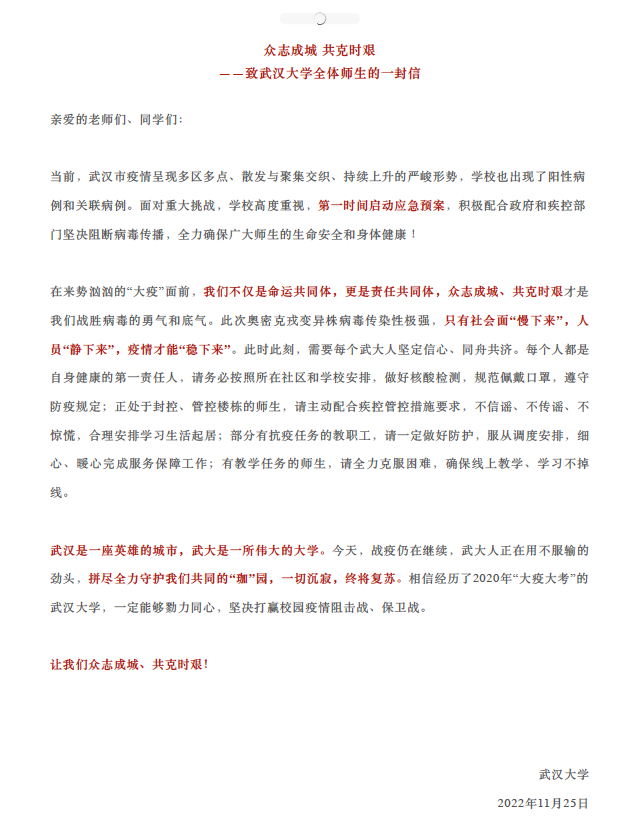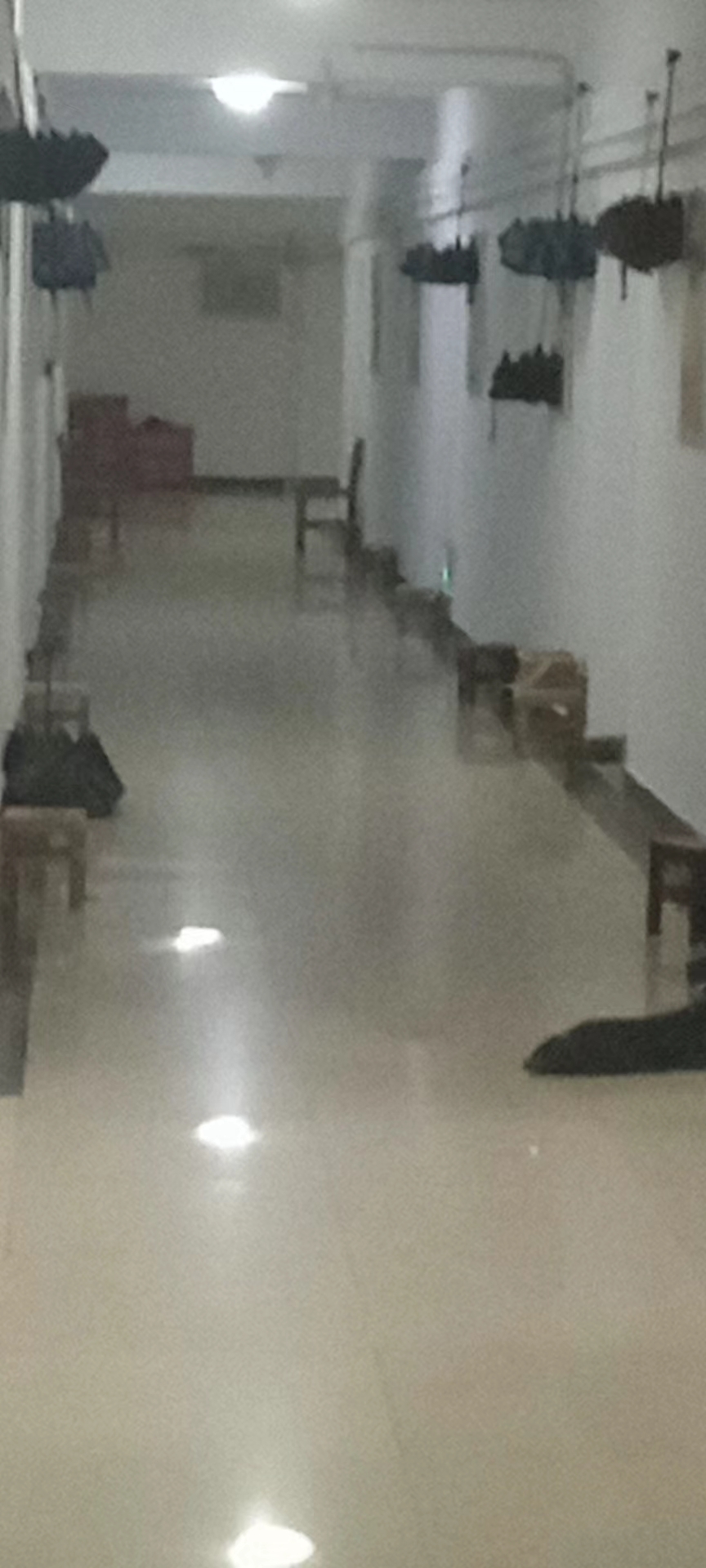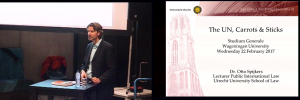Lockdown at Wuhan University Campus
28 November 2022

From February 2020 until October of 2022, I was a professor of international law at Wuhan University, China. Because of the disproportionate anti-COVID measures imposed on the poor people of Wuhan, including the students residing on the beautiful campus of Wuhan University, I felt compelled to resign and return to the Netherlands. Of course, I remain very much concerned about what is happening with the people on the campus that I love so much.
Unfortunately, today the situation on the campus of Wuhan University is not good. And I believe it is important for people all over the world to know what is happening to them, so that we can show our solidarity with them and help them fight for change. That is what has motivated me to write the following letter.
A few days ago, some students living on the campus of Wuhan University tested positive for COVID. This is what the person in charge of Wuhan University’s epidemic prevention and control said about it in a recent interview: “On the evening of November 22, 2022, the school was notified by the disease control department that 1 mixed tube (20 people) in the nucleic acid testing site of the old gymnasium of the Division of Engineering and Science had a suspicious result. After review, one of the graduate students (living in the 17th dormitory of the Department of Informatics) tested positive. The school attaches great importance to it. Under the guidance of the higher-level government and relevant departments, it immediately launched an emergency plan for epidemic prevention and control, sealed off the entry and exit of relevant areas and campuses, and cooperated with a series of emergency control measures such as flow adjustment and transfer of isolated and close contacts.”
Later tests showed more positive cases. Because the university is reluctant to publish the results of COVID-testing, it is difficult to find out exactly the results of the constant testing. In any case, in most parts of the world, students testing positive for COVID would be urged to stay home and avoid contact with others. But this is not what happened at Wuhan University. Basically, all students residing on campus are in lockdown. They are allowed to leave their room, but not their dormitory building. Every day, the students must wait for their three meals to be delivered at the dormitory building. They must go downstairs to the hall to collect their food. The food is distributed by some volunteers. These are just ordinary meals that they would otherwise eat in the university canteens, albeit that the meals delivered are below the standard, and they are not very generous portions. The students can still order goods and groceries online, but the delivery is becoming more and more difficult. And the prices of the supermarkets on campus – which allow for delivery – has risen sharply. Few fruit shops on campus are currently in business.
A particularly rigid system is put in place for the dorm where the student testing positive resides. Students living there are not allowed to leave their room. They have their food delivered to their room. Those inside the most restricted building cannot order fruits from the food shop owner on campus, which is something other students are still allowed to do.
The students are tested for COVID daily, around 9.00 in the morning. Some are required to go down to the first floor of their dormitory to take the test. Others receive visits from doctors in their room. All university teaching is done online and all social activities on campus have been postponed. Students are strongly advised to wear a mask even within the dormitory.
Fire exits in at least two of the dormitory buildings are blocked, either by plastic blocks (see photos below) or even iron obstacles. Fortunately these iron blocks were removed after a few days. The students are all very aware of the deadly fire that occurred in the city of Urumqi, and they are afraid the same may happen to them if the fire doors remain blocked in this way.
One of the biggest problems is that the students are not provided with any official announcement or other information on how long this quarantine will last. Essentially, they are not informed of what is going on, and what is being done to them at all. This is particularly problematic because the students are dependent on various apps managed by the authorities. For example, some of the students’ health codes suddenly turned yellow or red for no reason, and they have nowhere to complain about this. Some students are moved to other places because of an abnormal health QR code. Those that remain in the dorms have no idea where their friends are moved to, or what is done to them. This also adds to the feeling of anxiety.
Even those teachers and other volunteers who implement the quarantine say that they themselves receive no information at all, and that sometimes they are even being updated about changing policies later than students. It seems that the reason why the students get little information from the teachers and other volunteers is that the governmental authorities are taking over control of the quarantine.
Already the lockdown is leading to anxiety, depression, and other mental health problems amongst the students. They are helping each other, but they still feel that that there is little they can do. Over the last couple of years, this young generation of students is getting used to the continuous expansion of public power. But it seems a breaking point has been reached the last couple of days. More and more people express themselves on WeChat, openly and in unambiguous language. Students told me they do not know what will happen to them when they become the first student in the building to seek communication with those teachers or staff members who are in charge, but, so they say, someone must be the first to make their voices heard.
On 25 November, a letter to all teachers and students of Wuhan University was sent by the administration of Wuhan University.
In the letter, the university announced the immediate launching of an emergency plan to “resolutely block the spread of the virus and make every effort to ensure the safety and health of the teachers and students.” The letter also noted that, “in the face of the menacing ‘pandemic’, we are not only a community of destiny, but also a community of responsibility” and that “it is our courage and confidence to overcome the virus if we unite as one and overcome difficulties together”. The administration is urging its students and staff to follow the rules and regulations, and to “not believe rumours, not spread rumours, not panic”.
On the same day, a group of first-year students wrote a reply letter to Wuhan University.
They wrote that, “with the current official information, ‘not believing rumours, not spreading rumours, and not panicking’ seems to be an impossible task – without authoritative information channels, it is impossible to judge what a rumour is”. At the end of their letter, the students make some very practical suggestions to the administration. First, they ask to be provided with timely and correct information. Additionally, “the school prevention and control headquarters are requested to put people first and carefully consider whether it is possible to send students home once the epidemic continues to worsen”. Also, the students urge the administration to ensure enough food is distributed to the students in lockdown, and that the internet – their only gateway to the outside world – works properly. This letter only remained visible on WeChat for less than 24 hours. Like all other articles making protests or revealing the facts, it vanished quickly. This further complicates attempts to get an accurate view of the always changing situation.
People are expressing themselves more and more on WeChat and other online platforms. One person wrote that “I think the biggest sadness for myself is that the last three years have really changed me. I will no longer be able to see the world with the same eyes as I did in 2019, nor will I simply treat people the way I did then, and it doesn’t make me a better person, it just makes me angrier.” And elsewhere, a call for action was posted: “Remain angry. Benefits are lost in constant silence and cowardice. Do not be patient; patience is not a virtue. Questioning and verification are the weapons of resistance. Resistance is realized by gathering again and again, and by shouting again and again. The answer is in the air. Courage and unity can bring us the brightest fire in the winter night. Don’t ever be an ostrich with its head in the ground.”
Otto Spijkers










